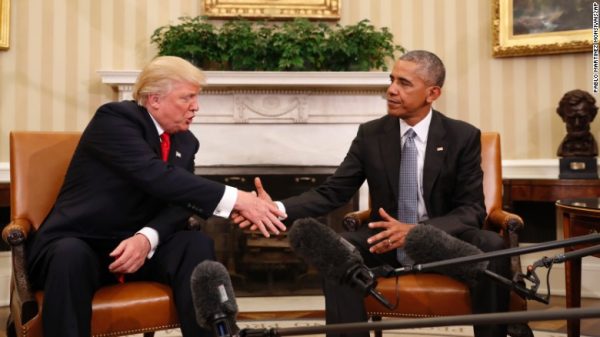 By Kathleen Parker
By Kathleen Parker
First, a history refresher: For the past nine years, a smattering of Americans, most recently led by our now president-elect, have insisted that Barack Obama is a Muslim born in Kenya.
For years, Donald Trump was unrelenting in his insistence that Obama prove beyond existing proof that he was born in Hawaii and not in the African country of his biological father. That Obama said he is a Christian wasn’t enough to persuade Trump’s followers, who apparently know a Christian when they see one.
Further, there is no logical basis for assuming that a young person briefly raised in a given country — say, Indonesia — necessarily would adopt the dominant religion of that country. He might, however, observe that though people worship in different ways, we’re all essentially the same. Never mind the cruel and absurd assumption that being a Muslim means that one is, ipso facto, a “bad person.”
Respecting others despite differences is, generally speaking, the hallmark of an enlightened soul, as well as a desirable disposition in a leader. Yet, those who sided with Trump interpreted Obama’s gentle touch toward the world’s 1.6 billion Muslims as evidence of a hidden agenda to advance Islam in the United States — notwithstanding Obama’s rather robust drone operations, which eliminated quite a few bad actors who happened to be, or said they were, Muslims.
Noteworthy is that these same Obama doubters weren’t bestirred to suspicion when then-President George W. Bush visited a mosque immediately after 9/11. Nor, thus far, have they expressed any concern about Trump’s cavalier approach to Russia’s cyberattack on the United States.
U.S. intelligence agencies released a declassified version of their report on Russian intervention in the 2016 U.S. election on Jan. 6, just hours after President-elect Donald Trump was briefed by American officials. (Video: Peter Stevenson: The Washington Post/Photo: Jabin Botsford/The Washington Post)
Given this history and recent evidence, isn’t it about time Trump be declared a Russian spy?
No, I don’t really think he’s a spy because, unlike the man himself, I’m not given to crazy ideas. But what’s with this double standard? Under similar circumstances, how long do you think it would have taken for Obama to be called a traitor for defending a country that tried to thwart our democratic electoral process?
How surreal to realize that the man who soon will become president was long committed to a rumor soaked in paranoia and propagated by conspiracy theorists whose pursuit of truth stops at the point where facts and willful ignorance collide.
How perfectly terrifying.
And now? What is so obviously a conspiracy of Russian leadership, hackers and spies, Trump has repeatedly dismissed as lousy intelligence. Why would he do such a thing? Is it that he’s so thin-skinned he can’t tolerate anyone thinking that he might have benefited from the cyberattack? Or is it that he knew about it in advance and doesn’t want to be found out? This is how conspiracy theories get started. Then again, sometimes a conspiracy is just a conspiracy — and a fool is just a fool.
Consider what we know: Our best intelligence indicates that Russia was behind the hacking of the Democratic National Committee. Trump, who has long expressed admiration for Russian President Vladimir Putin (once a KGB agent, always a KGB agent), has his doubts.
Washington Post reporter Adam Entous breaks down Friday’s intelligence report on Russian involvement in the 2016 election. (Dalton Bennett/The Washington Post)
Obviously, Trump wants to preserve the narrative that he won fair and square. And, clearly, claims of Russian interference would muss his ego. But is that it? Ego and narrative?
Consider further: Trump would rather make common cause with our fiercest geopolitical adversary (hat tip Mitt Romney) than take the word of our best people. Moreover, he has said he won’t receive daily security briefings and reportedly plans to reduce our security agencies.
Pray tell, whose side is this man on? When was the last time you had to ask that question about a president-elect?
On Friday, Trump met with real American spies and others who attempted to explain things to him, leaving open the question: Can Trump learn? From his statement following the meeting, it doesn’t seem so.
On Thursday, James R. Clapper Jr., the director of national intelligence, told the Senate Armed Services Committee that the agency is “now even more resolute,” and that Trump is damaging American intelligence (not to be confused with the absence thereof, to wit, Trump). To top things off, former CIA director James Woolsey quit Trump’s transition team Thursday in protest against being bypassed.
In sum, when the president-elect persists in a state of denial, siding with the enemy against his own country’s best interests, one is forced to consider that Trump himself poses a threat to national security.
In Russia, they’d just call it treason.
THE WASHINGTON POST

Leave a Reply
You must be logged in to post a comment.